
1905-1910 NYC: The Architectural and Cultural Flourishing of New York City
The early 20th century, specifically between 1905 and 1910, marked a pivotal shift in New York City’s architectural landscape. This period witnessed the rise of iconic structures that redefined the city’s skyline. The Singer Building, completed in 1905, soared to 47 stories, claiming the title of the world’s tallest building at the time. This architectural achievement was soon followed by the Metropolitan Life Insurance Company Tower, completed in 1909. It held the title of the tallest building until 1913, further solidifying New York City’s status as a burgeoning metropolis.
Concurrently, New York City’s subway system, inaugurated in 1904, underwent rapid expansion. The opening of the IRT Lexington Avenue Line in 1905 was instrumental in connecting the city’s diverse neighborhoods, facilitating both residential and commercial development across the boroughs. This expansion significantly transformed the city’s physical and socio-economic landscapes.
This era was marked by a significant cultural renaissance. The New York Public Library’s main branch, a standout Beaux-Arts building, began construction in 1902 and opened in 1911, symbolizing the city’s dedication to cultural enrichment. Moreover, the evolution of Broadway’s theater district, with the openings of the Hudson and New Amsterdam Theaters in 1903, mirrored the city’s expanding artistic landscape.
During this period, New York City underwent profound economic changes. Following the Panic of 1907, Wall Street emerged more robust, prompting critical banking reforms that contributed to the establishment of the Federal Reserve System in 1913. Simultaneously, the city’s population growth, fueled by immigration and urbanization, led to diverse social challenges. These included the need for new approaches to housing and public services, reflecting the city’s evolving demographics.
Timeline of New York City’s History 1905-1910
Discover surprising historical facts about The City That Never Sleeps—explore fun, educational insights into its history, population, iconic landmarks, and more, perfect for students, history enthusiasts, and anyone curious about NYC’s rich heritage.
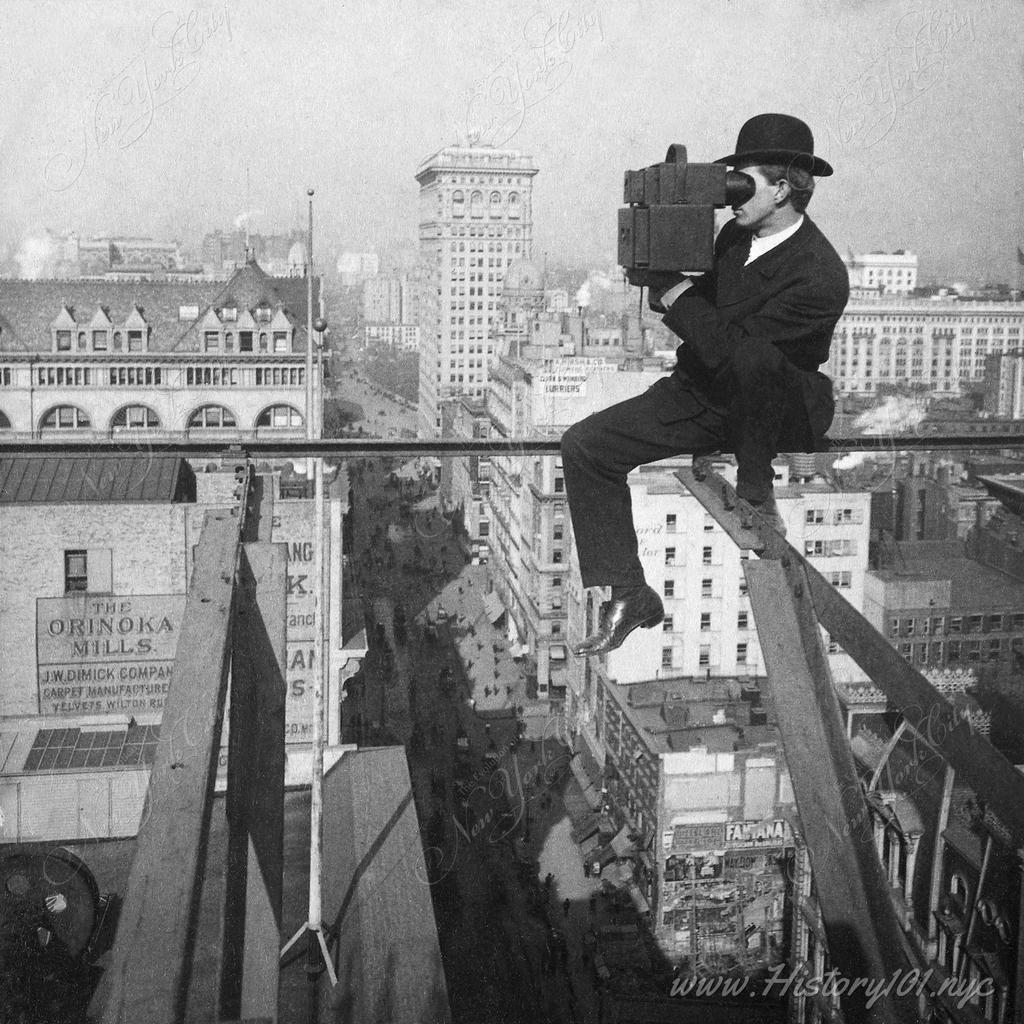
1905: Photographing NYC from 18 Stories
A photographer shooting the skyline 18 stories above pavement of Fifth Avenue, as he sits on a thin support beam of a skyscraper under construction.
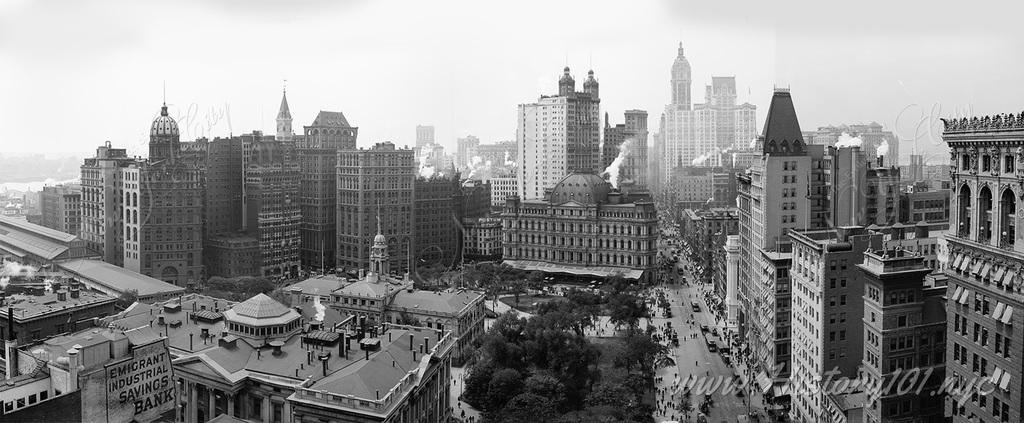
1908: The Heart of Downtown New York City
A panoramic photograph of Manhattan's downtown skyline, including City Hall and the Singer Building.
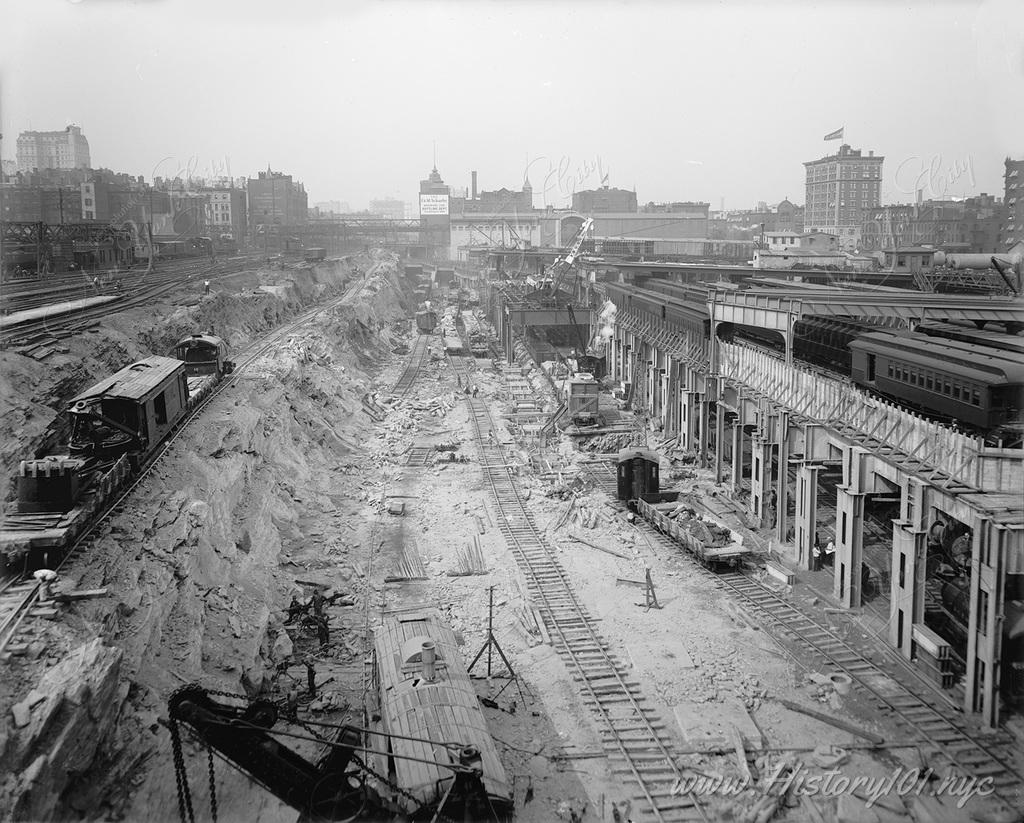
1908: Excavations for Grand Central Station
Construction workers clear several stories of earth and rock to lay the groundwork for what would become one of the city's most busy transit network.
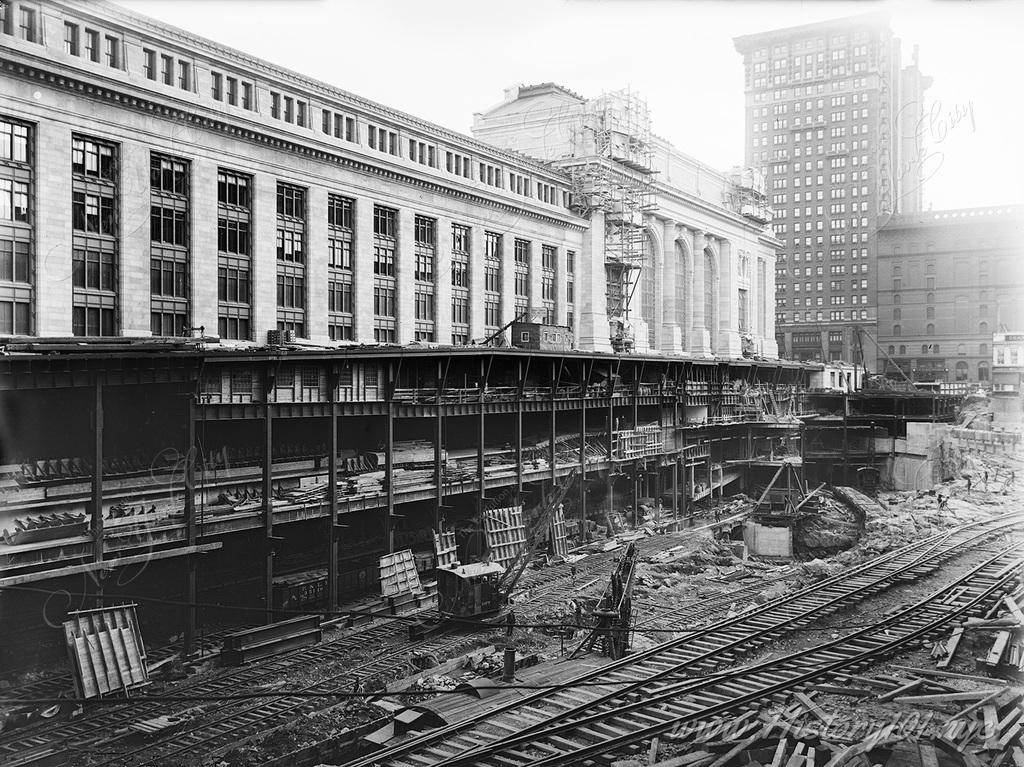
1905: Construction of Grand Central Terminal
Construction on Grand Central Terminal started on June 19, 1903, as New York state legislature would ban all steam trains in Manhattan by 1908.
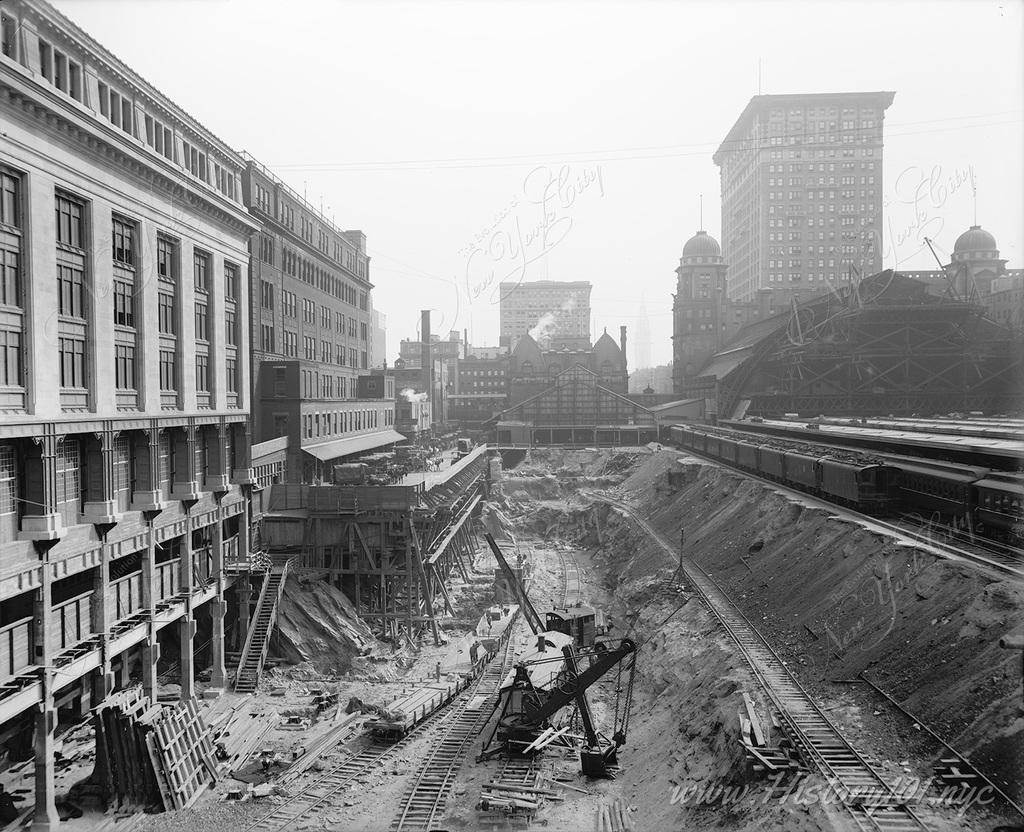
1908: The First Tracks of Grand Central Station
A straight perspective following the direction of the newly laid train tracks which would help to service thousands, and eventually millions of commuters a day.
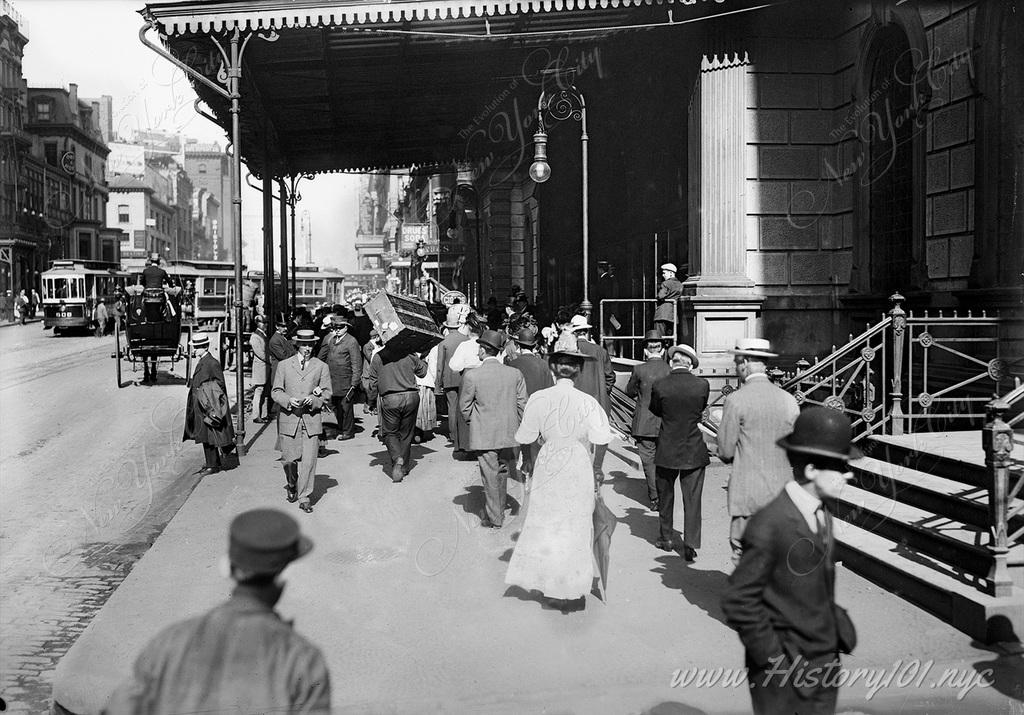
1908: Crowd in Front of Grand Central Terminal
A crowd of pedestrians pass the entrance of Grand Central Terminal with horse carriages and trolleys visible on the street.
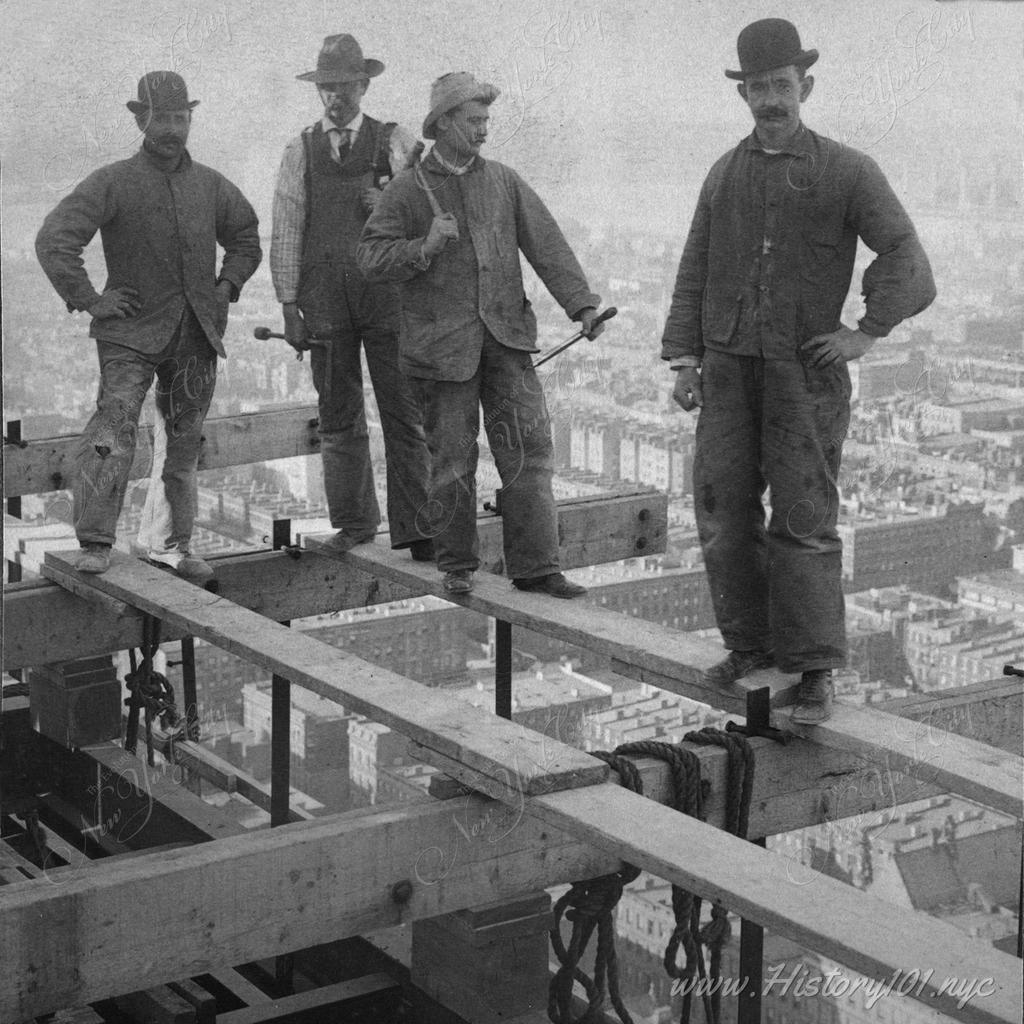
1905: Construction Workers on the 27th Floor of the New Times Building
Workmen risking their lives 27 stories above ground at the construction site of the new "Times" Building, New York City.
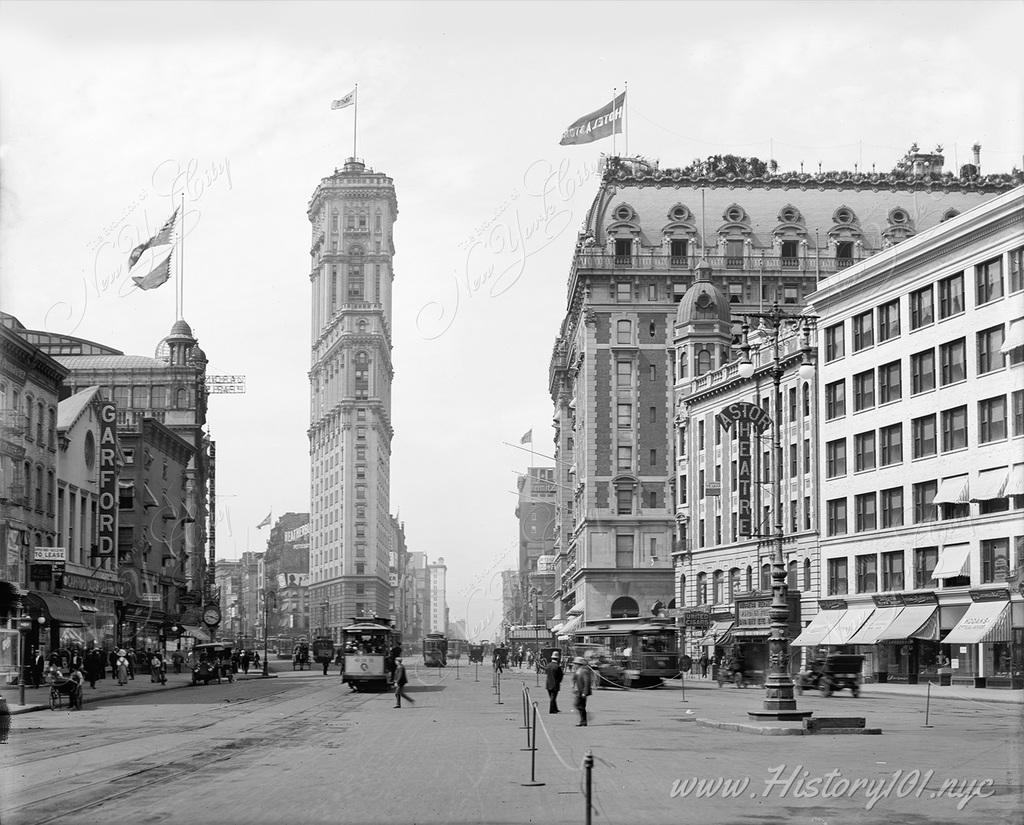
1908: Times Square Transformation: Times Building and Hotel Astor Unveiled
A daytime photograph of Times Square and the New Times Building, with pedestrians and trolleys in the foreground.
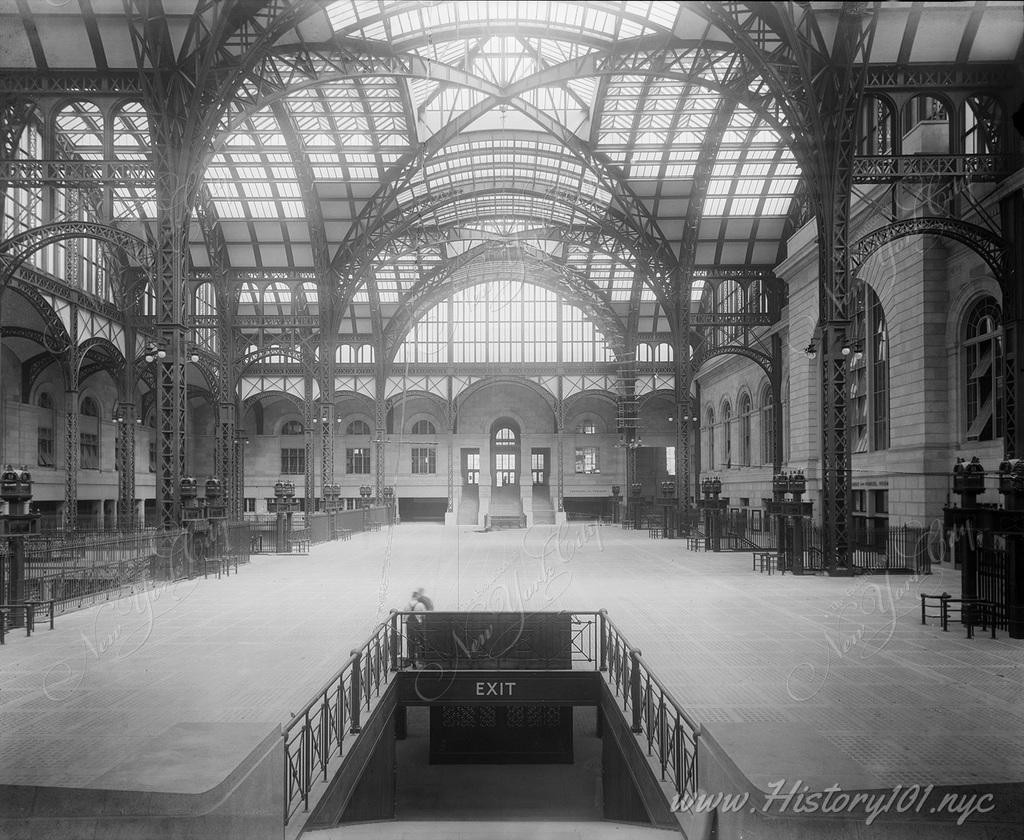
1905: Main Concourse at Pennsylvania Station
A photograph which illustrates the great style, symmetry and lighting of Penn Station's Main Concourse.
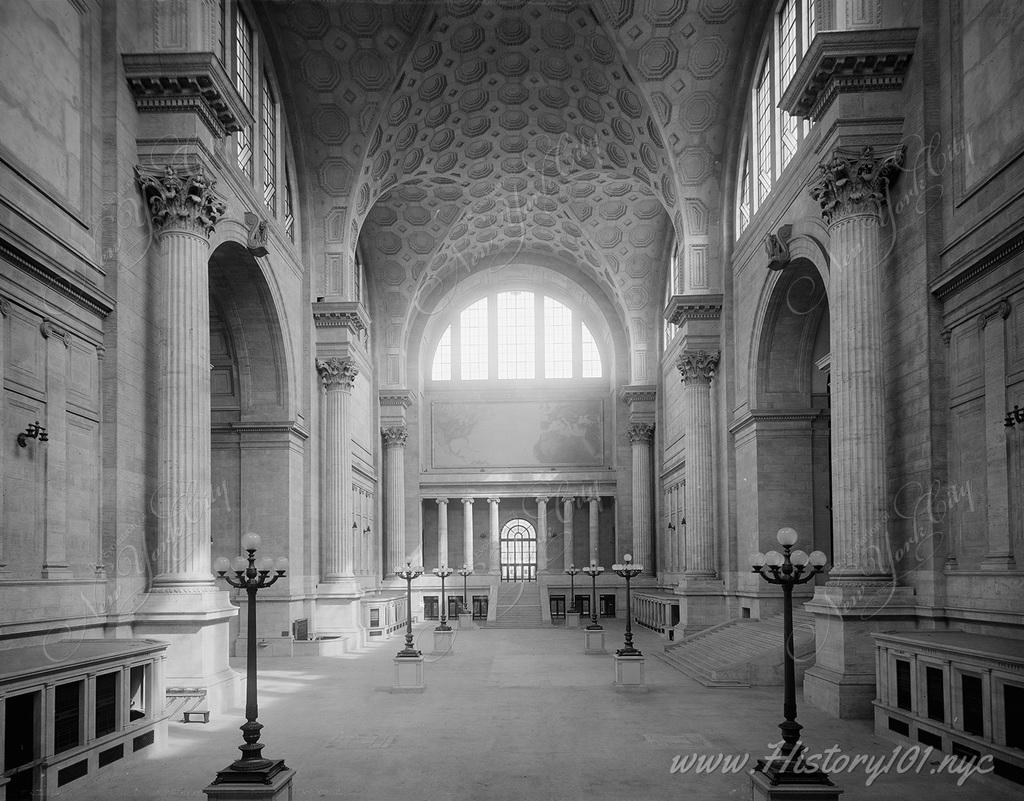
1905: Main Waiting Room at Pennsylvania Station
Interior view of Penn Station's famously opulent waiting room, with its high vaulted ceilings and turn-of-the-century stonework.
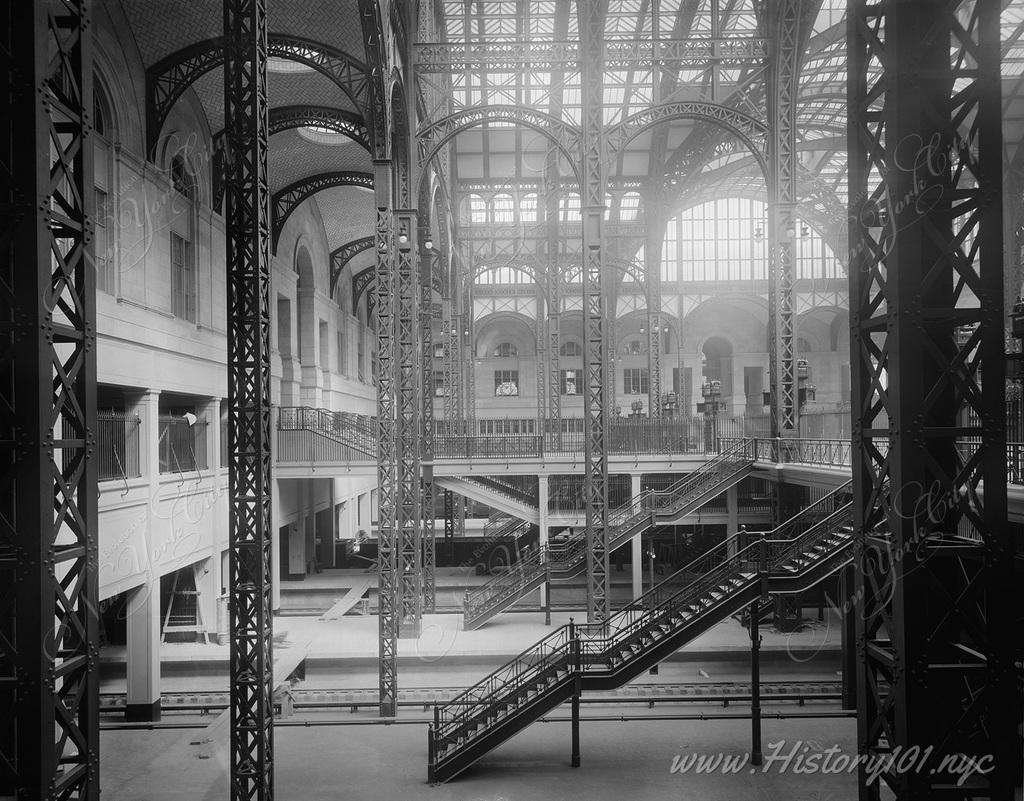
1905: Track Level and Concourses at Pennsylvania Station
Interior view of Penn Station's concourses, drenched by the sun due to the greenhouse-inspired design of its glass ceiling.
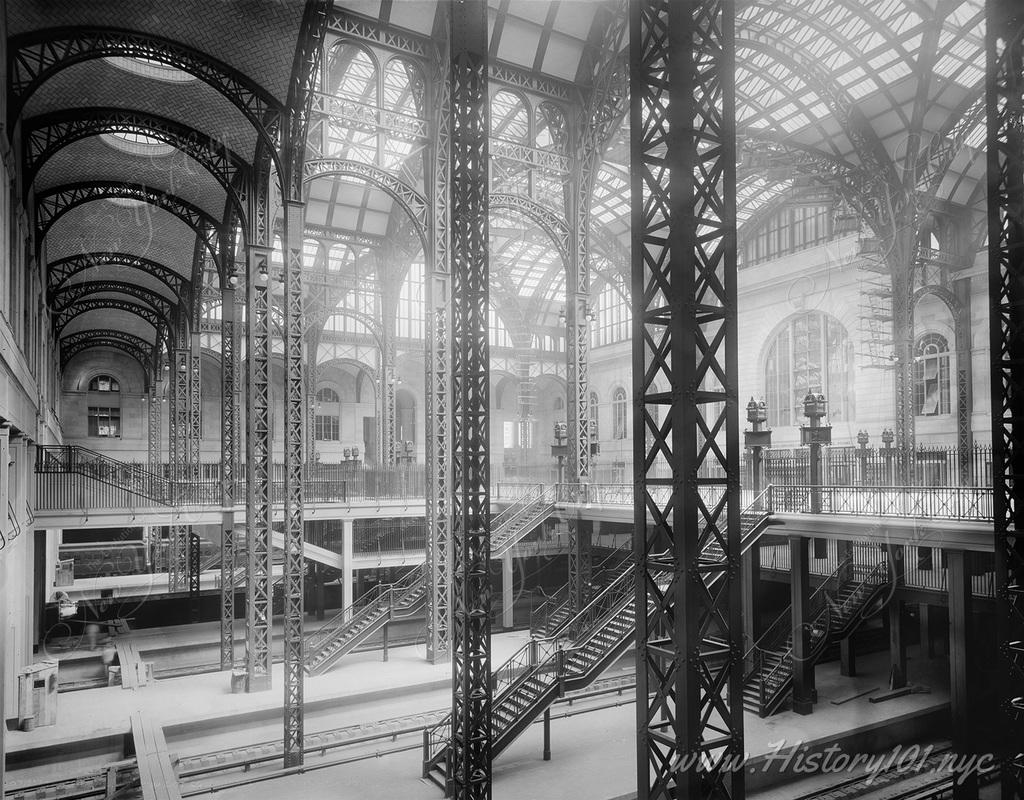
1910: Penn Station: Architectural Masterpiece Shaping NYC's Transit History
Explore Penn Station's 1910 debut, a Beaux-Arts jewel by McKim, Mead & White, pivotal in reshaping NYC's transportation and urban fabric
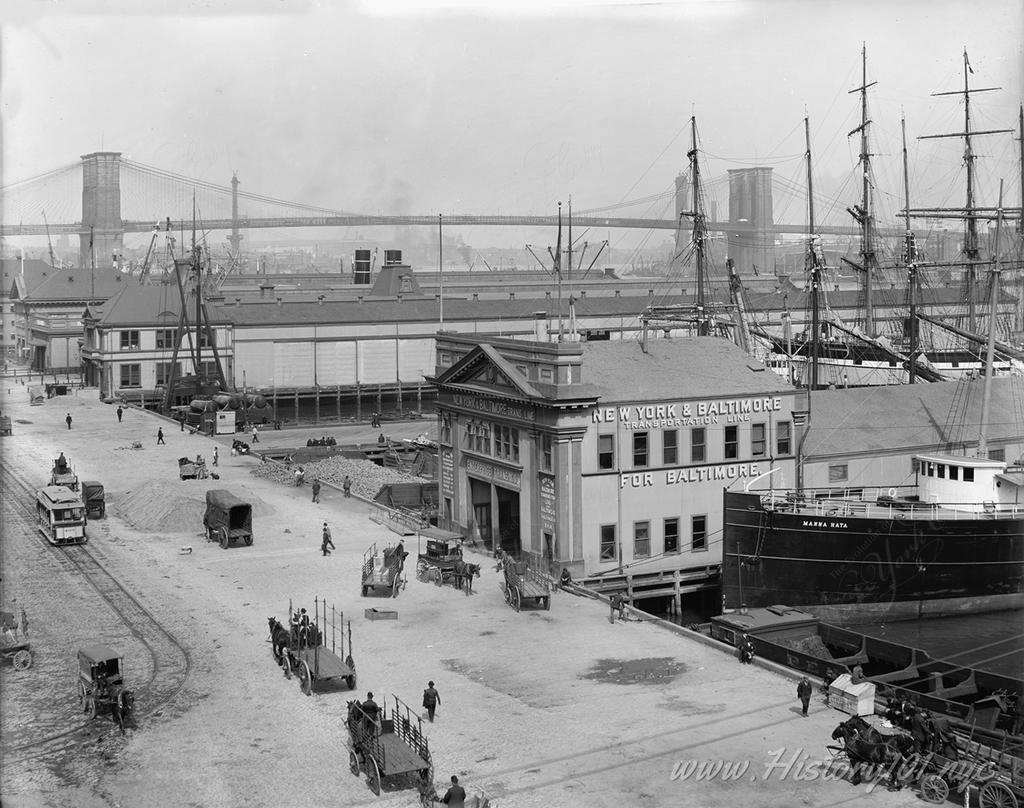
1908: Piers Along South Street
Aerial photograph of South Street Seaport with the East River and Brooklyn Bridge in the background.
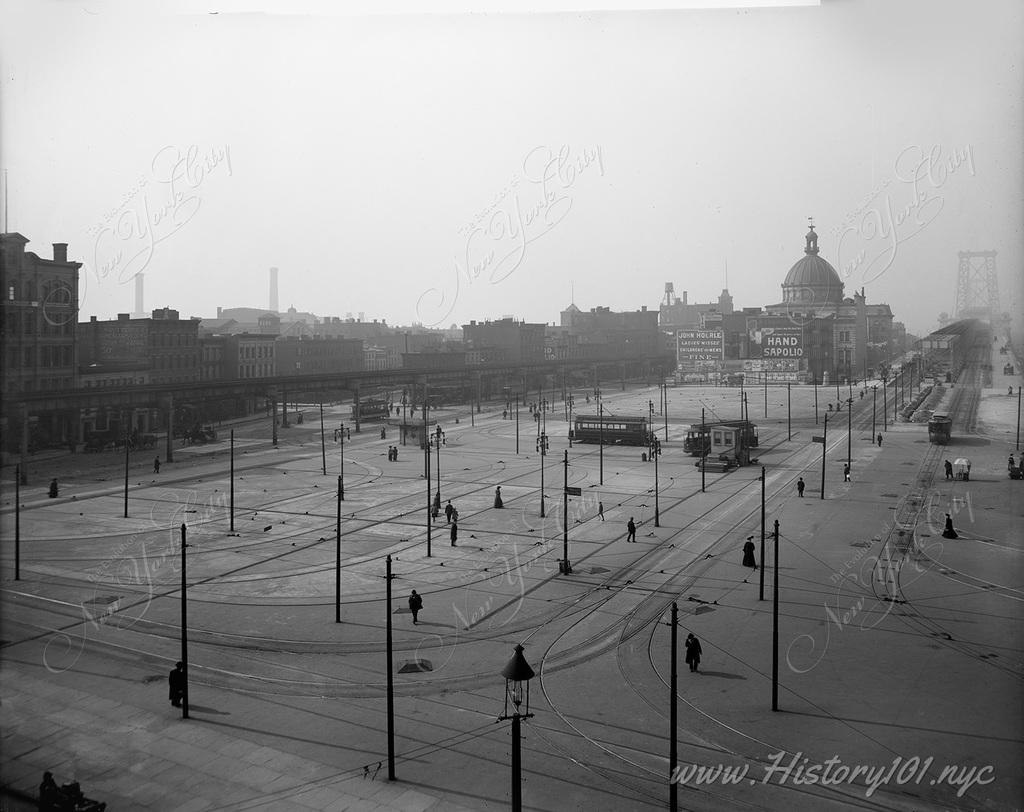
1906: Williamsburg Bridge Plaza, Brooklyn New York
Aerial view of the Plaza at the foot of the Williamsburg Bridge in Brooklyn, New York.
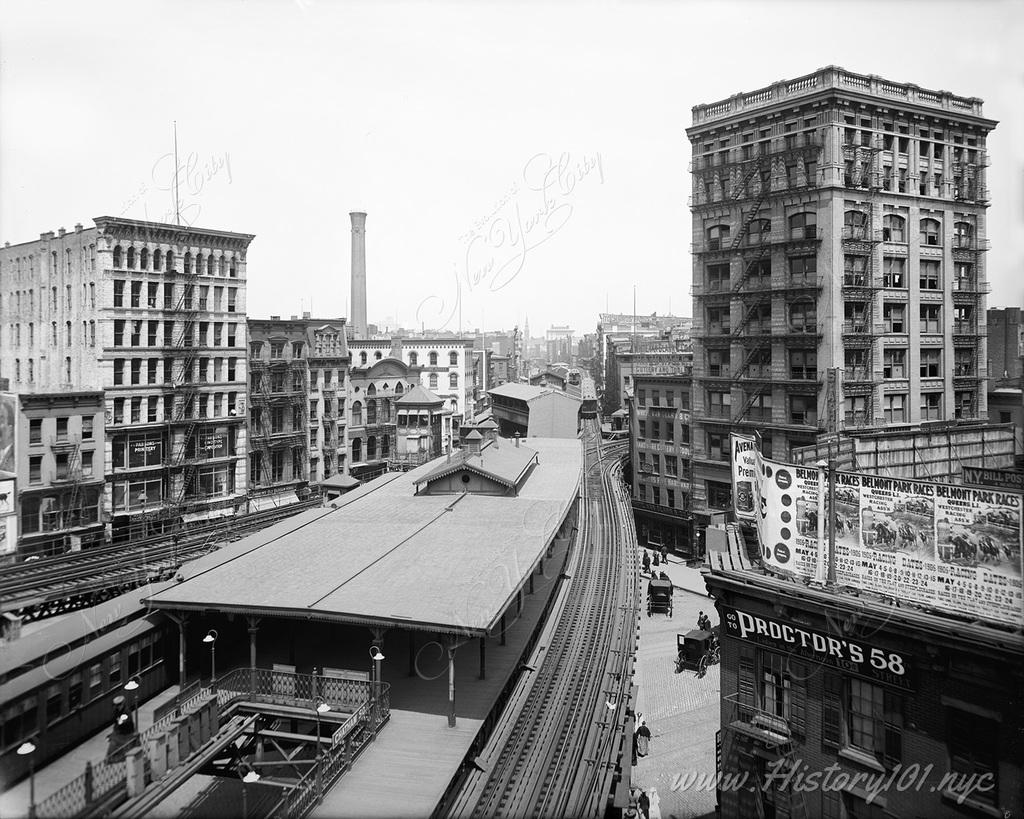
1905: Elevated (L) Station at Chatham Square
Chatham Square was an express station on the demolished IRT Third Avenue Line. Its lower level served trains of the IRT Second and Third Avenue Lines.
Timeline of New York City: 1905-1910
1905: New York State conducted a census that was especially important for understanding the demographic changes in New York City, following a decade without such data due to skipped census activities in 1895. The results from this census, along with federal data collected in 1900 and 1910, illustrate significant growth in the city's population. Specifically, in 1900, the total population of New York City stood at 3,437,202. This figure saw a substantial increase by the 1910 federal census, which recorded a population of 4,766,883. These numbers reflect the city’s rapid urban expansion, fueled by both immigration and natural growth, with each of the five boroughs experiencing their unique patterns of development.
The borough-specific data from these census reports highlight the uneven distribution of this growth. For example, the population of the Bronx more than doubled from 200,507 in 1900 to 430,980 by 1910, indicating a major shift as the city expanded northward. Brooklyn and Manhattan also saw significant increases; Brooklyn’s population grew from 1,166,582 to 1,634,351, and Manhattan's from 1,850,093 to 2,331,542 over the same period. Meanwhile, Queens and Staten Island, although smaller in terms of absolute numbers, demonstrated remarkable percentage increases. This demographic expansion was a key driver of New York City’s evolution into a leading global metropolis, affecting every aspect of city life from infrastructure to cultural institutions, shaping the dynamic and diverse character that defines New York City today.
1905: The influential art gallery known as 291, or "Little Galleries of the Photo-Secession," was opened by Alfred Stieglitz and Edward Steichen at 291 Fifth Avenue in New York City. This gallery became a pivotal force in transforming the American art scene by introducing modern, avant-garde, and European art to an American audience that had little prior exposure to these genres. Through its commitment to showcasing groundbreaking artworks and its central location, and played an essential role in promoting new forms of art within the American cultural landscape, becoming a landmark institution in the history of American art.
Beyond merely showcasing photography, 291 established itself as a crucial hub for cultural exchange and artistic innovation. It supported and elevated the profiles of emerging artists such as Pablo Picasso and Henri Matisse, playing a vital role in their acceptance and success in the U.S. market. Through its dynamic exhibitions and influential clientele, and significantly contributed to establishing New York City as a global center for art and culture. The gallery's impact was profound, leaving a lasting imprint on the city's artistic development and helping to forge a vibrant cultural identity that would attract artists and enthusiasts from around the world.
1905: Ratner's restaurant opened its doors in Manhattan's Lower East Side, quickly becoming a culinary and social landmark renowned for its Jewish kosher dairy cuisine. Reflecting the Eastern European Jewish community's culinary traditions, Ratner's offered a unique dining experience that resonated deeply with the cultural heritage of its patrons. Beyond serving food, the restaurant evolved into a vital social nexus, attracting a diverse crowd that included writers, actors, and politicians. This mix of clientele enhanced its reputation and established it as more than just a restaurant; it was a pivotal gathering place within the community.
Ratner's impact on New York City's culinary scene was profound, particularly in popularizing Jewish cuisine, until its closure in 2002. Located in a culturally rich immigrant neighborhood, the restaurant not only contributed to the local economy but also played a significant role in the cultural vitality of the Lower East Side. Even after its doors closed, the legacy of Ratner's continued to symbolize New York City's diverse community and culinary richness. It left behind a lasting imprint on the city's culinary and cultural history, commemorating a century of service that intertwined deeply with the narratives of its patrons and the broader community.
1905: Gertrude Ederle, born in New York City on October 23, is a seminal figure in the history of sports, particularly women's swimming. Her groundbreaking achievement on August 6, 1926, when she became the first woman to swim across the English Channel, marked a monumental moment in sports. This feat not only shattered previous records but also significantly bridged the gap in perceptions of women's athletic capabilities compared to men's.
Ederle's triumph transcended sports, becoming a beacon of inspiration for women worldwide and enhancing New York City’s reputation as a hub for exceptional talent. Her legacy is intricately woven into the city’s rich cultural tapestry, celebrating the spirit of perseverance and resilience. She passed away on November 30, 2003, but her historical impact continues to resonate, spotlighting New York City's influential role in shaping global sports history.
1905: James J. Braddock, born on June 7 in New York City's Hell's Kitchen and famously known as the "Cinderella Man," is an iconic figure in the rich history of boxing. His ascent from a struggling Depression-era boxer to the heavyweight champion of the world embodies the resilience and hope that New York City is known for. His victory over Max Baer for the heavyweight title on June 13, 1935, at Madison Square Garden didn't just revive his floundering career; it also uplifted the spirits of many Americans facing tough economic times.
Braddock's legacy continues to resonate in New York City, where his story is celebrated as part of the rich cultural and sporting history. The iconic boxer, who passed away on November 29, 1974, helped to cement Madison Square Garden's reputation as a landmark sporting venue. His life and achievements are a significant chapter in the narrative of New York, symbolizing the quintessential American dream of rising through adversity, which continues to inspire both sports enthusiasts and the general populace. Adding to his enduring legacy is Russell Crowe's portrayal of Braddock in the 2005 film "Cinderella Man," which brought the boxer's triumphant story to a new generation, highlighting his impact on both the sport and American culture.
1906: The Hammerstein Ballroom, originally known as the Manhattan Opera House, was inaugurated on West 34th Street. Built by Oscar Hammerstein I, this establishment served as a grand venue for opera performances, significantly enriching New York City's architectural and cultural landscape. Its creation during the vibrant early 20th-century arts scene reflected the city's dynamic cultural growth and its dedication to becoming a prominent arts center in America. The venue's elaborate design and grand scale immediately established it as a key landmark within Manhattan, offering a new prestigious platform for performing arts.
Over the decades, the Hammerstein Ballroom has continued to play a pivotal role in New York City's entertainment sector. Evolving from its original opera house roots, the venue has hosted a diverse array of events, ranging from high-profile operas to modern concerts and theatrical performances. This adaptability has kept it relevant and vital in New York City's arts and entertainment landscape, aligning with the city’s reputation as a global hub for arts and culture. The Hammerstein Ballroom’s enduring appeal and versatility highlight its integral role in the cultural history of New York City, continually attracting both performers and audiences from around the world for over a century.
1906: John Carradine's legacy as a distinguished actor began in New York City, where he was born on February 5. His early years in Greenwich Village, a neighborhood synonymous with artistic innovation, undoubtedly influenced his career in classical Hollywood cinema. Over the decades, he left an indelible mark on the film industry with iconic roles in classics like "Stagecoach" and "The Grapes of Wrath." His contribution to the arts highlights New York City's pivotal role in nurturing talent that impacts global culture and entertainment.
Carradine's extensive filmography and theatrical contributions continue to enrich New York's cultural heritage. His story exemplifies the city's capacity to foster artistic talent, contributing to its storied reputation as a haven for creatives. His passing on November 27, 1988, marked the end of an era, but his influence persists, enhancing New York City's historical and cultural narrative as a key hub in the entertainment world.
1906: DeWitt Clinton Park was established in Manhattan's Hell's Kitchen area, symbolizing New York City's commitment to enhancing its urban fabric with accessible public green spaces. Named after the prominent New York Governor and U.S. Senator DeWitt Clinton, who was instrumental in the creation of the Erie Canal, the park's development was part of an early 20th-century initiative aimed at integrating public spaces into the city's urban design. This strategic move was designed to meet the needs of the city's rapidly growing population and the increasing demands of urbanization, providing a much-needed recreational area amidst the bustling city environment.
Since its inception, DeWitt Clinton Park has evolved into a crucial recreational and cultural hub for the local community, embodying New York City's dedication to enhancing the quality of life for its residents through thoughtful urban planning. The establishment of the park marked a significant milestone in the city's efforts to balance robust urban development with the preservation and creation of green spaces. It remains a cherished oasis in Manhattan, highlighting the city's ongoing commitment to maintaining and expanding its green infrastructure to ensure sustainable and livable environments for all its inhabitants.
1906: Benjamin "Bugsy" Siegel, born on February 28, in New York City, is a prominent figure in American history for his pivotal role in the development of the Las Vegas Strip. As a notorious gangster, Siegel's influence extended beyond the typical criminal enterprises, venturing into the visionary transformation of Las Vegas into a gambling and entertainment mecca. His efforts helped shape the city's future, making him a crucial part of its history despite his infamous background.
Siegel's impact is also felt in New York City's history, where his early life and activities contributed to the complex tapestry of the city's development during the early 20th century. His story encapsulates the dual nature of opportunity in America—where both legitimate business and the underworld could shape the destinies of cities like New York and Las Vegas. When he was killed in 1947, Siegel left behind a legacy interwoven with the development and transformation of these urban landscapes, marking him as a significant, if controversial, historical figure.
1906: Julia Barnett Rice founded the Society for the Suppression of Unnecessary Noise in New York City, pioneering the fight against urban noise pollution. This organization emerged as one of the earliest advocates for noise abatement, addressing the growing concerns over the health and quality of life impacts caused by excessive noise in an increasingly industrialized urban environment. By raising public awareness and advocating for change, the Society aimed to mitigate the disruptive effects of noise in daily life, emphasizing the importance of a quieter, more peaceful urban setting for the wellbeing of its residents.
The establishment of the Society for the Suppression of Unnecessary Noise was a critical milestone in the evolution of environmental noise control, particularly within the bustling metropolis of New York City. Through its efforts, the organization influenced early legislation and policies related to noise regulation, laying the groundwork for contemporary noise control measures. The advocacy and initiatives led by the Society significantly contributed to public health improvements and the enhancement of urban living conditions, underscoring the critical role of environmental considerations in the planning and development of urban areas.
1906: Established by Italian immigrant Luisa Leone, Mamma Leone's restaurant began as a modest 20-seat eatery in Manhattan. It quickly became a cornerstone of New York City's culinary scene, celebrated for bringing authentic Italian cuisine to the city. This early establishment not only introduced New Yorkers to genuine Italian flavors but also played a crucial role in diversifying and evolving the city's food landscape. Through Mamma Leone's, diners experienced a taste of Italy that was both novel and delightful, helping to broaden the culinary horizons of locals and visitors alike.
As the years passed, Mamma Leone's grew substantially in size and reputation, mirroring the dynamic growth of New York City's restaurant industry. Known for its hearty portions and vibrant ambiance, it became an iconic culinary destination, appealing to a diverse clientele that included both locals and tourists. The success of Mamma Leone's not only underscored the significant impact of immigrant contributions to New York's cultural and gastronomic fabric but also cemented its place in popular culture. Notably, the restaurant was immortalized in Billy Joel’s song “Movin’ Out (Anthony’s Song),” which reflects on New York’s working-class aspirations and challenges. This mention in a popular song highlights Mamma Leone’s cultural resonance, showcasing its iconic status beyond the culinary world and into the realm of pop culture, embodying the spirit and energy of New York City.
1906: The Playground Association of America is established, and later known as the National Recreation Association, catalyzed a transformative approach to public parks in urban settings, notably in New York City. Advocating for active recreation facilities in city parks, the Association spearheaded a shift from viewing parks as passive green spaces to centers for physical activity and community engagement. This movement marked a significant evolution in public space utilization and perception, aligning with early 20th-century urban development trends.
Influencing New York City's urban planning and public health strategies, the Association's efforts led to the incorporation of playgrounds and recreational facilities in city parks. This alignment with broader social reform movements enhanced urban living quality and addressed public welfare, especially for children. These initiatives were instrumental in promoting community building and adapting to the changing needs of a rapidly growing urban population.
1906: New York City was rocked by the sensational murder of Stanford White, on June 25, one of the most prominent architects of his time, who played a crucial role in shaping the city's skyline. The incident occurred at Madison Square Garden, a major landmark that White himself had designed. He was killed by Harry Kendall Thaw, a wealthy Pittsburgh millionaire, whose motive stemmed from a personal vendetta related to White's previous romantic involvement with Thaw’s wife, Evelyn Nesbit. Nesbit was a well-known showgirl and model, making the scandal even more sensational due to the high-profile nature of all involved parties.
Dubbed "The Crime of the Century," Stanford White's murder not only captivated national attention but also highlighted the complex interplay of wealth, fame, and scandal that defined the era. The trials that followed became a media sensation, reflecting the societal obsessions and dynamics of early 20th-century America. This case wove a narrative of intrigue that resonated deeply across the country, underscoring the emerging influence of media in public life and the enduring fascination with the lives of New York's social elite. The aftermath of this high-profile crime continued to influence cultural and social discourse long after the event, cementing its place in the annals of American crime history.
1906: Joan Blondell, a notable figure in Hollywood's Golden Age, was born on August 30, in New York City. Her career, spanning several decades, began in the bustling vaudeville circuits before transitioning to the silver screen during the early sound era of cinema. Her vivacious personality and dynamic acting style were shaped by her early life in the culturally rich environment of New York City, which is renowned for its significant contributions to theater and film.
Blondell's New York upbringing infused her performances with a blend of toughness and charm, traits that endeared her to audiences and critics alike. She passed away on December 25, 1979, but remains a celebrated part of New York City's artistic legacy. Her work not only highlights the city's historical role as a launchpad for artistic talent but also continues to inspire new generations of actors and performers.
1906: Crockett Johnson, born as David Johnson Leisk on October 20, in New York City, significantly contributed to children's literature through his work as a cartoonist and author. His most famous creation, "Harold and the Purple Crayon," continues to inspire and captivate young minds with its simplicity and imagination. Johnson's books highlight the creative potential inherent in every child, echoing the innovative and artistic spirit of his hometown.
His legacy extends beyond the pages of his books. Johnson’s contributions to children's literature underscore New York City's role as a nurturing ground for influential artists and writers. This relationship enriches the city's cultural heritage, spotlighting its significance in fostering literary and artistic talents that resonate globally. Johnson passed away on July 11, 1975, but his impact on both the literary world and New York's cultural scene remains enduring and profound.
1907: On February 14, New York City became the birthplace of the first U.S. foxhound association, an event marking a significant contribution to the cultural and recreational landscape of early 20th-century America. This establishment underscored New York's role as a pivotal center for diverse social activities, reflecting its dynamic and evolving societal interests. By founding this association, the city facilitated the growth of organized sports and recreational hunting, activities that were gaining popularity across the country. This initiative not only enriched the recreational options available to New Yorkers but also played a crucial role in fostering community engagement and social interaction among its residents.
The formation of the first U.S. foxhound association in New York City on Valentine's Day 1907 also illustrates how the city was instrumental in setting trends that influenced broader American cultural practices. This pioneering organization helped lay the groundwork for similar groups across the United States, promoting standards and practices that would shape the future of recreational hunting and dog breeding. By hosting this association, New York City reinforced its status as a cultural and social innovator, attracting enthusiasts and influencing other cities to embrace and promote organized recreational activities.
1907: New York City witnessed the advent of its first taxi service, a significant milestone that reshaped the urban transportation landscape. The introduction of motorized taxis was pivotal in accommodating the city’s rapid growth during the early 20th century, offering a new and efficient mode of transport that complemented the existing network of horse-drawn carriages and trolleys. This innovation greatly enhanced mobility for New Yorkers, allowing for quicker and more convenient travel across the city’s diverse neighborhoods and proving essential in the daily lives of millions of residents and visitors.
The deployment of taxis on May 31, not only improved individual mobility but also had broad economic implications for New York City. The burgeoning taxi industry stimulated job creation and supported the automotive sector, which was just beginning to flourish. Additionally, taxis played a crucial role in facilitating commerce and tourism, helping to sustain the city's economic dynamism and reinforcing its reputation as a center of innovation and activity. This transportation evolution marked a transformative period in New York City's history, showcasing its capacity to adapt to technological advancements and changing urban demands.
1907: The Plaza Hotel officially opened its doors on October 1st, at the prestigious intersection of Fifth Avenue and Central Park South in New York City. This opening marked the beginning of the hotel's storied history as a symbol of luxury and elegance. Designed with a distinctive architectural style that blended French Renaissance and Beaux-Arts elements, the Plaza Hotel quickly established itself as an iconic landmark. Its prime location overlooking Central Park further cemented its status as one of the city’s most coveted destinations, embodying New York City’s architectural grandeur and opulence in the early 20th century.
Since its inception, the Plaza Hotel has played a crucial role in shaping the cultural and social fabric of New York City. It has hosted an array of high-profile events, from lavish society galas to important business gatherings, making it a central meeting place for influencers from around the globe. These events have not only added to the hotel’s prestige but have also significantly contributed to the local economy by attracting international tourists and business travelers. Designated as both a New York City Landmark and a National Historic Landmark, the Plaza Hotel's enduring legacy continues to be intricately linked with the city’s evolution, reinforcing its reputation as a global icon of luxury and hospitality.
1907: On August 13, New York City witnessed a significant evolution in its transportation infrastructure with the introduction of the first taxicabs, imported by businessman Harry N. Allen. Motivated by an experience of being overcharged by a hansom cab driver, Allen sought to revolutionize urban transport by offering a service that used a meter to charge passengers fairly based on the distance traveled. He launched his service with 65 gasoline-powered cars, a move that marked a departure from the traditional horse-drawn carriages and set a new standard for future public transport within the city.
This introduction of metered taxicabs was a pivotal development for New York City, enhancing its reputation as a modern and accessible metropolis. The standardization of fare charges brought transparency and efficiency to the taxi industry, fostering greater trust among passengers and contributing to the city's economic vitality. Over time, the taxicab service became an iconic aspect of New York City's urban culture, integral to the daily movements of millions of residents and visitors. Allen's innovative approach not only transformed the way people moved across the city but also cemented the taxi's role as a crucial element of New York's bustling and dynamic public transport system.
1907: On September 13, the RMS Lusitania arrived in New York City, marking a significant milestone in maritime history by completing the Atlantic crossing in a record five days. This achievement not only showcased the technological advancements in shipbuilding and maritime navigation but also demonstrated the growing capability of ocean liners to connect continents more quickly and efficiently than ever before. The Lusitania, operated by the Cunard Line, was one of the largest and fastest ships of its time, and its swift journey from Liverpool to New York was celebrated as a monumental achievement that would set new standards for transatlantic travel.
The Lusitania's record-setting arrival in New York City on that day had profound implications for the city's status as a leading global port. This event underscored New York's pivotal role in international maritime commerce and travel, enhancing its appeal as a destination and transit point for international travelers and goods. The increased traffic and the prestige associated with hosting such technologically advanced vessels boosted local businesses and contributed to the city's economic growth. Additionally, the Lusitania's regular voyages between Liverpool and New York helped cement the city's position as a critical hub in the network of global transportation, reinforcing its economic and cultural links with Europe and beyond.
1907: The Japan Society was established in New York City, marking the beginning of a centennial institution dedicated to fostering cultural exchange between Japan and the United States. The society was instrumental in enhancing mutual understanding and relationships through its comprehensive programming focused on Japanese culture, arts, and traditions. Over the years, it has played a crucial role in introducing significant aspects of Japanese culture to a New York audience, diversifying the city's cultural landscape with a variety of events and programs that showcase traditional and contemporary Japanese arts.
The influence of the Japan Society has not only enriched cultural appreciation but also strengthened international relations between the U.S. and Japan, enhancing New York City's reputation as a global cultural hub. Through initiatives like language classes, cultural workshops, and art exhibitions, the society has broadened New Yorkers' perspectives on Japanese culture and contributed to the city's educational offerings. Additionally, in 1971, the Japan Society's headquarters, a striking building that blends modernist architecture with traditional Japanese design elements, was completed, adding an architectural highlight to New York's landscape.
1907: Florenz Ziegfeld Jr. launched the Ziegfeld Follies, igniting a new era in New York City's theatrical scene. This series of Broadway extravaganzas, known for their grandeur and opulence, was staged primarily at the New Amsterdam Theatre until 1931. These productions revolutionized Broadway with their lavish costumes, elaborate sets, and a unique blend of music, dance, and comedy. The Ziegfeld Follies not only transformed theatrical productions with their scale and spectacle but also set a new standard for entertainment in the heart of New York City, capturing the imaginations of audiences and critics alike.
The impact of the Ziegfeld Follies extended beyond mere entertainment, significantly influencing both the cultural and economic landscapes of New York City. These performances drew large audiences, which in turn bolstered the local economy by increasing spending in surrounding areas, including restaurants and hotels. The Follies also served as a platform for nurturing and showcasing artistic talent, with many performers finding fame through their association with these shows. The legacy of the Ziegfeld Follies remains an integral part of New York City’s rich theatrical history, symbolizing a period of vibrant cultural expression and creativity that continues to resonate in the city’s cultural narrative today.
1907: The Alexander Hamilton U.S. Custom House in Lower Manhattan was completed and stands as a testament to the Beaux-Arts architectural style, designed by the renowned architect Cass Gilbert. This majestic building was named in honor of Alexander Hamilton, a key figure in the U.S. financial system, and originally served as a vital customs processing hub for New York City. The structure not only symbolizes Hamilton's legacy but also reflects New York City's significant role in international trade and commerce during the early 20th century. Its strategic location and grand design underscored the city's burgeoning status as a global economic powerhouse at the time.
Today, the Alexander Hamilton U.S. Custom House houses the National Museum of the American Indian, showcasing New York City's ongoing commitment to preserving and repurposing its historic landmarks. This adaptive reuse of the building has allowed it to retain its cultural and historical significance while contributing to the city’s rich tapestry of cultural offerings. As a landmark, the Custom House continues to be a focal point of architectural admiration and serves as a reminder of New York City's enduring economic and historical legacy. This transformation from a customs house to a museum not only preserves its architectural grandeur but also enhances its relevance as a center for cultural enrichment and education within the city.
1907: John Marley, born on October 17, in New York City, is celebrated for his impactful role in the classic film "The Godfather." His portrayal of Jack Woltz, the Hollywood mogul who memorably finds a horse's head in his bed, stands as a defining moment in cinema. Marley's performance highlights the reservoir of talent emerging from New York City, which continues to leave a lasting imprint on the world of film.
Marley's distinguished career also includes a pivotal role in the film "Love Story," where he played the father of Ali MacGraw's character, further showcasing his versatile acting skills. This performance, along with his role in "The Godfather," underscores the vital contribution of New York City-born actors to the cultural and entertainment fabric globally. When he passed away on May 22, 1984, Marley left behind a legacy that encapsulates the vibrant and influential nature of New York City's arts scene, underscoring the city's ongoing influence on the global stage.
1907: Audubon Terrace quickly became an architectural and cultural landmark in New York City's Washington Heights. This complex was designed in the Beaux-Arts style by architect Charles Pratt Huntington and was named to honor the legacy of naturalist John James Audubon. As a distinctive enclave of culture and education, Audubon Terrace housed several prestigious institutions, including the American Geographical Society, the Hispanic Society of America, and the American Numismatic Society. Its establishment marked a significant enhancement in the city's cultural infrastructure, highlighting its commitment to supporting the arts and sciences within a historically significant setting.
Over the years, Audubon Terrace has solidified its status as a vital center for educational and cultural enrichment. It has become a hub for intellectual and artistic activities, significantly contributing to the cultural diversity and intellectual vibrancy of both its local neighborhood of Washington Heights and the broader New York City area. The presence of such esteemed institutions within the complex has catalyzed intellectual growth and cultural exchange, fostering a community deeply engaged in scholarly pursuits and the arts. This ongoing impact underscores Audubon Terrace's role not just as a physical space, but as a dynamic force in the cultural and educational advancement of the city.
1907: On December 31, the first Times Square Ball Drop occurred, inaugurating a tradition that would become synonymous with New Year’s Eve celebrations worldwide. This event was originally held to commemorate the opening of the New York Times building at One Times Square and quickly captured the public's imagination. It marked the beginning of what would become an annual celebration, turning Times Square into a focal point of commercial and entertainment activities in Manhattan. Every year, the event draws vast crowds to Times Square, who gather to count down the final moments of the year in unison, celebrating the arrival of the New Year amidst a backdrop of vibrant lights and festive energy.
Over the years, the Times Square Ball Drop has evolved into a significant global attraction, symbolizing the universal celebration of the New Year while highlighting New York City's role as a cultural and entertainment capital. With advancements in technology, the event has incorporated cutting-edge features, from LED lights to energy-efficient designs, reflecting the city's commitment to innovation and artistry. The Ball Drop not only continues to enrich New York City's cultural and economic landscape but also stands as an iconic global symbol of New Year's Eve, attracting tourists from around the world and broadcasting New York City's festive spirit to millions of viewers annually.
1908: The Singer Building was completed at Liberty Street and Broadway in Lower Manhattan, immediately claiming the title of the world's tallest building—a distinction it held until 1909. Designed by architect Ernest Flagg, the building was an icon of its era, reaching a height that symbolized the architectural and engineering prowess of the early 20th century. The Singer Building was not just a functional space for the Singer Manufacturing Company; it was also a significant milestone in skyscraper design, influencing the New York City skyline and marking a period of rapid architectural innovation and urban expansion.
Despite its historical and architectural significance, the Singer Building was demolished in 1968 to make way for One Liberty Plaza, reflecting the constant evolution of New York City’s urban landscape. Its removal sparked debates over historical preservation, highlighting the city’s ongoing challenge of balancing modern development with the preservation of its architectural heritage. The Singer Building’s story from rise to demolition encapsulates New York City's dynamic growth and serves as a poignant example of the transformative forces at play in urban planning. Its legacy continues to influence discussions about architectural conservation and the historical significance of buildings in shaping the character of the city.
1908: Ethel Merman, a legendary figure in American musical theatre, was born on January 16, in Astoria, Queens, New York City. Her robust voice and charismatic stage presence catapulted her to stardom on Broadway, where she became synonymous with the musical comedy genre. Merman's career spanned over 30 years, during which she starred in classic musicals such as "Anything Goes" and "Gypsy," becoming one of the most enduring icons of the Broadway stage.
Merman's impact on New York City's cultural landscape was profound. Her performances contributed significantly to the global prestige of Broadway and helped cement New York City's reputation as a leading center for theater arts. When she passed away on February 15, 1984, Merman left behind a rich legacy that continues to inspire and influence performers around the world, underscoring the cultural richness and historical importance of New York City in the arts.
1908: On May 26, an unprecedented event in automotive history was recorded as Mr. and Mrs. Jacob Murdock, along with their children, became the first family to traverse the United States by automobile. The family embarked on their groundbreaking journey from Los Angeles, choosing a Packard Thirty as their vehicle. This journey, which spanned 32 days, 5 hours, and 25 minutes, tested the limits of early automotive engineering and paved the way for future cross-country travel, demonstrating the car's potential to connect distant corners of the country.
This historic trip concluded in New York City, underscoring its importance as a national hub and a symbolic finish line for such an adventurous endeavor. The Murdock family's arrival in New York not only marked a personal achievement but also signified New York City's role in the broader narrative of America's transportation evolution. Their journey highlighted the practicality of automobiles for long-distance travel and helped to shift public perceptions about the reliability and utility of motor vehicles. The event captured the imagination of the public and media alike, contributing to New York City's reputation as a focal point of technological and cultural milestones.
1908: On June 12, the RMS Lusitania completed its Atlantic crossing, arriving in New York City with a record time of 4 days, 15 hours. This achievement set a new standard for oceanic travel, showcasing the advancements in maritime technology that characterized the early 20th century. The Lusitania, known for its speed and luxury, was one of the largest passenger ships at the time, operated by the Cunard Line. Its arrival in New York was celebrated as a monumental event, illustrating the possibilities of modern engineering and enhancing the ship's reputation as the fastest vessel on the transatlantic route.
The record-setting journey of the Lusitania in 1908 significantly bolstered New York City's prominence as a leading port and gateway for international travelers and commerce. By hosting such a landmark event, the city reinforced its position as a central hub in the network of global maritime travel, attracting attention and visitors from around the world. This not only contributed to the city's economic vitality but also its cultural diversity, as New York became a focal point for the exchange of people, goods, and ideas. The Lusitania's arrival exemplified the city's dynamic role in the age of rapid technological progress and its capacity to adapt and thrive amidst these changes.
1908: On July 6, explorer Robert Peary set sail from New York City on an expedition aimed at reaching the North Pole, a feat that had captivated adventurers and the public imagination alike. This expedition, marked by its departure from one of the world’s most prominent cities, was closely watched by a global audience. New York City, known for its pivotal role in commerce, culture, and communication, served as the launching point for this significant exploration. The event highlighted the city's connection to major global undertakings, reinforcing its status as a gateway for historical endeavors in exploration and discovery.
The significance of Peary's 1908 expedition from New York City extended beyond the immediate spectacle of the journey. It showcased the city’s strategic importance as a starting point for international expeditions, which brought substantial attention and economic benefit to the area. Hosting events such as Peary's departure underscored New York City's role in the broader narrative of global exploration during the early 20th century. Furthermore, such explorations fostered a sense of pride and communal spirit among the city’s residents and contributed to New York’s legacy as a city central to significant historical developments, enhancing its image both nationally and internationally.
1908: The Brooklyn Academy of Music (BAM), an influential cultural institution in New York City, was initially founded in 1861. However, after a devastating fire destroyed the original building, a new facility was completed in 1908, allowing BAM to continue its mission of providing diverse and innovative cultural offerings. This new building enabled BAM to expand its reach and influence, hosting a wide array of performances that included opera, theater, and music, thus playing a critical role in enriching the cultural landscape of Brooklyn and the broader New York City area.
The completion of the new Brooklyn Academy of Music building significantly enhanced New York City's status as a cultural hub. Located in Brooklyn, the new facility not only replaced the lost structure but also provided a state-of-the-art venue that attracted top-tier performers and large audiences, contributing to the city’s economic and cultural vitality. This establishment has continued to serve as a beacon of artistic excellence, drawing both national and international attention to Brooklyn's thriving arts scene. The resilience and growth of BAM over the years underscore New York City’s commitment to fostering an environment where arts and culture flourish, reinforcing its identity as a global center for creativity.
1909: The Met Life Tower at One Madison Avenue in Manhattan was completed, soaring into the New York City skyline as the world's tallest building at the time, a title it held until 1913. Designed by the architectural firm Napoleon LeBrun & Sons, the tower drew inspiration from the Campanile in Venice, Italy, featuring a distinctive clock tower that quickly became an architectural icon. This landmark not only reshaped the Manhattan skyline but also reflected the city’s burgeoning status as a center for architectural innovation and the skyscraper race that characterized early 20th-century urban development.
The completion of the Met Life Tower showcased not only the architectural prowess of the era but also the economic strength of its owner, the Metropolitan Life Insurance Company. As one of the leading insurance companies at the time, Met Life's choice to erect such a significant headquarters underscored its influence and confidence in the future. The tower's presence on Madison Avenue and 23rd Street significantly impacted Manhattan's urban landscape, contributing to the area's development as a business hub. This development further cemented New York City's reputation as an architectural innovator and financial powerhouse, highlighting its role in shaping modern urban skylines.
1909: On February 12, American runner James Clark made history by setting a world record for the marathon, completing the course from Brooklyn to Coney Island in 2:46:52. This achievement was particularly noteworthy due to the challenging winter conditions, which did not deter Clark or the spectators from participating in the event. Clark’s record was part of a series of record-breaking performances throughout 1909, a year that proved pivotal in the evolution of marathon running. These events not only tested the limits of athletic endurance but also captured the public's imagination, boosting interest in long-distance running across the United States.
This record-setting run by James Clark significantly contributed to New York City's rich sporting history, emphasizing the city's role as a key venue for major athletic events. Approximately 110,000 spectators attended various marathon events throughout the year, demonstrating the community's strong support for marathon running. Such large-scale public participation highlighted New York City’s capacity to host significant sports events and helped to foster a vibrant culture of athletics. The attention drawn by these events also provided economic boosts to the city through increased visitor numbers and heightened local engagement, cementing New York City’s reputation as a center for both national and international sports competitions.
1909: On February 16, New York City introduced a significant innovation to its subway system with the launch of the first subway car featuring side doors. This design enhancement marked a pivotal shift in public transit, addressing previous limitations posed by end-only doors and improving the overall efficiency of subway operations. The implementation of side doors facilitated quicker and more convenient boarding and alighting for passengers, effectively reducing station stop times and enhancing the flow of commuter traffic. This transition was crucial for a city experiencing rapid growth in population and infrastructure, enabling the public transit system to keep pace with increasing demands.
The introduction of subway cars with side doors in 1909 not only improved daily commuting in New York City but also set a standard for subway systems worldwide. This development was instrumental in making New York's subway system more adaptable and efficient, a critical factor in the city's ongoing efforts to maintain its status as a leading global metropolis. The enhancement of subway transportation directly contributed to the city's economic and social vitality, facilitating easier access across the city and supporting New York's dynamic urban lifestyle. By continuously integrating technological advancements into its infrastructure, New York City underscored its commitment to improving urban life and remaining at the forefront of public transportation innovation.
1909: International Women's Day was established in response to a significant event in labor history that took place in New York City. On February 28, the day was first observed to honor the courageous efforts of 15,000 women who had marched through New York City the previous year, demanding better working conditions. This march was part of the broader struggle for women's labor rights and was catalyzed by the harsh realities faced by garment workers. The observance of International Women's Day has since become a global event, commemorating the ongoing fight for women's rights and serving as a reminder of the powerful impact of collective action initiated by the garment workers' strike in New York City.
The context for the first International Women's Day was the 1908 Uprising of the 20,000, a pivotal strike that began in November 1909 and continued until February 1910. This strike, led predominantly by female workers in the garment industry, marked a significant turning point in labor practices in the United States. Despite the strike not achieving its goal of union recognition, it led to substantial improvements in working conditions, higher wages, and shorter hours for thousands of workers. The effects of this labor action were profound, contributing significantly to the shaping of labor laws and the empowerment of women in the workforce. This event solidified New York City's role in the history of the women's labor movement and remains a testament to the city's influence on the national movement for labor rights and gender equality.
1909: On May 8, American runner Albert Raines made history by setting a new world record for the marathon in New York City, clocking in at 2:46:04.6. This achievement occurred during a period when marathon running was gaining significant popularity and public interest, particularly in the context of athletic feats and endurance sports. Raines' record-breaking performance not only brought him personal accolades but also contributed to elevating the status of marathon running as a serious and competitive sport. The event was a showcase of physical endurance and strategic racing, drawing attention to the burgeoning culture of long-distance running in the United States.
Hosting this world record event in 1909 provided numerous benefits for New York City, reinforcing its image as a premier venue for major international sports competitions. Such events were instrumental in promoting the city as a vibrant, dynamic locale capable of hosting large-scale sports events that attracted participants and spectators from across the globe. Furthermore, the success of this marathon helped to stimulate local businesses and increase media coverage of sporting events in the city, enhancing New York's cultural and economic landscape. As a result, the city not only bolstered its reputation within the sports community but also demonstrated its ongoing commitment to supporting and celebrating athletic excellence on a global stage.
1909: The New York City publishing scene witnessed a significant development with the merger of McGraw Publishing Company, founded by James H. McGraw in 1899, and Hill Publishing Company, established by John A. Hill in 1902. Both companies initially thrived by focusing on technical journals and educational materials, marking New York City as a critical center for publishing innovation and technical literature. Their early efforts catered to the growing professional and educational markets, playing a crucial role in disseminating specialized knowledge. This merger underscored New York City’s evolving role as a nexus for innovation in the publishing sector, bolstering its reputation as a leader in the dissemination of technical and educational content.
The formation of McGraw-Hill Publishing Company was a watershed moment in the U.S. publishing and educational landscape, significantly enhancing New York City's stature as a powerhouse in the publishing industry. This union allowed the new entity to expand its offerings beyond just technical fields, encompassing a wide range of educational and informational resources. The growth of McGraw-Hill in New York City not only fueled the city’s economic and cultural expansion but also solidified its influence in advancing national educational, technological, and professional development. This significant merger highlighted McGraw-Hill's pivotal role in shaping America's educational and industrial narratives, reinforcing the importance of New York City as a hub for critical publishing activity.
1909: The Hudson-Fulton Celebration, which spanned from September 25 to October 9, was a grand event held in New York and New Jersey to commemorate two pivotal moments in American history. The celebration marked the 300th anniversary of Henry Hudson's exploration of the Hudson River in 1609 and the centennial of Robert Fulton's launch of the Clermont in 1807, which was the first successful commercial paddle steamer. Organized by notable figures including J.P. Morgan and Andrew Carnegie, this festival highlighted New York's rich maritime history and its progress in maritime technology, drawing large crowds and receiving widespread attention for its historical and educational significance.
The celebration featured a dazzling array of events that showcased the technological progress and historical depth of New York City. Iconic landmarks such as the Statue of Liberty and Grant's Tomb were illuminated, adding a visual splendor to the festivities. The event included parades with historical and carnival themes, which depicted the evolution of New York from its indigenous roots to its status in 1909 as an urban powerhouse. Noteworthy attractions included replicas of Hudson's ship the Half Moon and Fulton's Clermont, alongside demonstrations of modern marvels such as Wilbur Wright's airplane flights. These highlights not only celebrated historical milestones but also demonstrated the city's ongoing commitment to technological innovation and cultural commemorations, reinforcing its role as a leader in both historical preservation and modern advancement.
1909: Founded on December 4, by James Henry Anderson with just $10, the New York Amsterdam News began as a modest operation out of Anderson's home in the San Juan Hill area of Manhattan's Upper West Side. Initially sold for 2 cents a copy, the newspaper quickly became a cornerstone of the African American community, providing an essential platform for voices and perspectives that were largely absent from mainstream media. As the Black population migrated to Harlem, the Amsterdam News moved with its audience, relocating first to 17 West 135th Street in 1910 and later to other locations in Harlem. By addressing key issues affecting the African American community, the paper solidified its role as a significant cultural and informative force in New York City.
Throughout its history, the Amsterdam News has been a pioneer in advocating for civil rights and labor rights, participating in crucial moments like the 1935 editorial staff strike, which marked the first unionized black paper, ensuring better working conditions and pay for its employees. The leadership of Dr. C.B. Powell, starting from the 1930s, marked a significant era during which the paper expanded its coverage from local to national news, influencing public opinion and policy regarding African American rights and community issues. The paper's commitment to representing and advocating for a multiracial community while focusing on Black aspirations has made it one of the most frequently quoted Black newspapers worldwide.
1909: Douglas Fairbanks Jr., born on December 9, emerged as a notable figure in the cinematic world, enhancing New York City's cultural prominence. His illustrious acting career began in the silent film era and transitioned into talkies, where he distinguished himself in numerous roles that captivated audiences worldwide. Fairbanks Jr.'s involvement in theater and film contributed significantly to New York's reputation as a cultural epicenter, attracting aspiring artists and fostering a vibrant arts scene.
Throughout his career, Fairbanks Jr. not only entertained millions but also engaged actively in social circles that highlighted New York City as a key location for theatrical and cinematic innovation. His death on May 7, 2000, marked the end of an era, but his legacy continues to influence the artistic community in New York, underscoring the city's enduring role in shaping global entertainment and culture. His life and work remain integral to the historical narrative of New York City, reflecting its dynamic evolution as a world-leading city in arts and entertainment.
1909: On December 11, New York City witnessed a significant milestone in cinematic history with the first public demonstration of Kinemacolor at Madison Square Garden. This groundbreaking event introduced audiences to the world's first successful color motion picture process, developed by George Albert Smith and commercially exploited by Charles Urban's Natural Color Kinematograph Company. Kinemacolor, an additive color system, utilized alternating red/orange and blue/green filters during both filming and projection to achieve its color effect. This early demonstration not only showcased vibrant moving images but also marked a turning point in the evolution of film, paving the way for future advancements in color cinematography.
The successful demonstration of Kinemacolor in New York City in 1909 played a pivotal role in establishing the city as a hub of cinematic innovation and cultural richness. This event attracted significant attention, drawing filmmakers, investors, and cinema enthusiasts eager to witness and engage with the latest technological achievements in the film industry. The introduction of color film technology not only enhanced the visual experience for audiences but also stimulated the local entertainment industry, contributing to New York City's economic and cultural vitality. By hosting such a landmark technological showcase, New York reinforced its reputation as a leading global center for arts and innovation, continuing to influence the development of cinema and entertainment technology worldwide.
1909: On December 31, the Manhattan Bridge was officially opened to traffic, marking a significant milestone in the architectural and infrastructural landscape of New York City. This bridge, the last of the three major suspension bridges constructed across the lower East River, connects Manhattan and Brooklyn, enhancing the urban connectivity essential for the city's growth. Originally referred to as "Bridge No. 3" during its planning stages, the Manhattan Bridge was designed by Leon Moisseiff. The design was particularly noted for its innovative approach that combined functionality with aesthetic appeal, thereby setting a new standard in bridge engineering and design at the time.
The Manhattan Bridge spans 6,855 feet and serves a vital role in supporting the city's transportation network, accommodating pedestrians, cyclists, vehicles, and subway lines. Its completion not only enhanced inter-borough connectivity but also spurred significant economic growth and urban development, integrating more seamlessly the diverse communities and economies of Manhattan and Brooklyn. Today, the bridge stands as an iconic feature of New York City’s skyline, recognized for its distinctive architectural style and its cultural and historical significance. This landmark continues to be celebrated not only for its physical and functional attributes but also for its enduring role in shaping the urban landscape of one of the world’s most dynamic cities.
1910: On March 18, a landmark moment in American cultural history was marked at the Metropolitan Opera House in New York City with the premiere of Frederick Converse's "The Pipe of Desire." This occasion was noteworthy as it represented the first time an American opera was performed at this prestigious venue. This achievement not only underscored the growing acceptance and appreciation of American composers within the classical music sphere but also highlighted the Metropolitan Opera's willingness to diversify its repertoire beyond European works. The event was a significant step in cultivating a distinctly American voice in the operatic tradition, showcasing the talents and unique perspectives of composers from the United States.
The inclusion of "The Pipe of Desire" in the Metropolitan Opera's season not only enriched New York City's cultural offerings but also served as a catalyst for further innovations within the American opera scene. This performance encouraged other American composers to aspire to similar heights, knowing that such prestigious platforms were within reach. For New York City, hosting the premiere of the first American opera at the Metropolitan Opera enhanced its reputation as a leading center of artistic innovation and cultural diversity. It demonstrated the city's role in shaping and advancing the arts, contributing to its identity as a global cultural capital where diverse artistic expressions and traditions could thrive.
1910: On May 12, the National Association for the Advancement of Colored People (NAACP) held its second conference in New York City. This pivotal event occurred just a year after the organization's establishment in 1909, demonstrating its rapid development and commitment to civil rights advocacy. The conference was a vital forum for discussing strategies to combat racial discrimination and promote equal rights in America. By convening in New York City, the NAACP utilized a prominent stage that underscored the city's growing importance as a center for national activism.
The choice of New York City as the venue for this significant event had substantial benefits for the city's historical and cultural narrative. Hosting the NAACP conference helped to cement New York’s role as a hub for progressive thought and social reform, drawing national attention to the city’s vibrant community of activists and thinkers. The gathering not only fostered discussions on important civil rights issues but also contributed to the broader social and political development of the city. Over time, these conferences and the ongoing activities of the NAACP in New York laid the groundwork for future civil rights actions and enhanced the city’s legacy as a leader in advocating for justice and equality.
1910: Laurance Rockefeller, born on May 26, in New York City, was a distinguished conservationist and philanthropist. His efforts profoundly influenced the American environmental landscape through his pivotal role in developing national parks and advocating for sustainable development. These efforts have left a lasting imprint on conservation practices, preserving natural habitats and fostering public environmental awareness and policy nationwide.
In New York City, Rockefeller's birthplace and philanthropic activities are integral to the city's historical narrative. His dedication to urban conservation has spurred many green initiatives, enhancing living conditions and establishing a model for future environmental planning. Rockefeller's legacy, following his passing on July 11, 2004, continues to shape conservation and urban development, emphasizing his enduring impact on both local and national stages.
1910: On May 31, Glenn Curtiss, an aviation pioneer, completed a historic flight from Albany to New York City. This 150-mile journey was not only a testament to his skill and daring but also a demonstration of the practical capabilities of aircraft at a time when aviation was still in its infancy. Curtiss's achievement was part of a competition sponsored by The New York World, a leading newspaper of the time, which offered a prize for the first successful flight between these two cities. This flight is particularly significant as it was one of the earliest instances of long-distance air travel in the United States, showcasing the potential for aircraft to transform transportation.
The successful completion of Curtiss's flight from Albany to New York City had a lasting impact on the history of New York and aviation. By linking two major cities through air travel, Curtiss not only captured the public’s imagination but also highlighted New York City’s role as a central hub for technological innovation and progress in the early 20th century. This event helped to pave the way for the future of commercial aviation, demonstrating that air travel could become a viable means of transportation for long distances. Moreover, it enhanced New York City's reputation as a place where new ideas and technologies thrive, further cementing its status as a modern metropolis at the forefront of industrial advancements.
1910: On August 9, a significant incident occurred that shook New York City's political scene when Mayor William Jay Gaynor was shot by James J. Gallagher, a disgruntled former city employee. The attack took place in Hoboken, New Jersey, as Mayor Gaynor was boarding the SS Kaiser Wilhelm der Grosse, destined for Europe. Remarkably, Mayor Gaynor survived this severe attack, which occurred against the backdrop of a tumultuous political era marked by intense anti-corruption campaigns. The incident not only spotlighted the period's contentious political atmosphere but also significantly impacted Gaynor’s tenure as mayor, as he was left with lasting health complications from the gunshot wound.
Despite the attempt on his life, Mayor Gaynor continued to serve in his capacity as mayor of New York City. His resilience was notable, but his remaining years in office were marred by the health issues that stemmed from the assassination attempt. These ongoing complications ultimately led to his death on September 10, 1913, a little over three years after the shooting. This dramatic sequence of events underscored the volatile political climate of New York City at the time, highlighting the urgent need for governance reforms and the high stakes involved in battling corruption within the city's administration.
1910: Penn Station was completed in Midtown Manhattan, heralding a new era in architectural and infrastructural development. Designed in the grand Beaux-Arts style by McKim, Mead, and White, the station was commissioned by the Pennsylvania Railroad and quickly became a significant landmark. Its construction symbolized an evolution in urban development and transport infrastructure, setting new standards for railway station design. Penn Station not only redefined the architectural dynamics of New York City with its majestic appearance and vast scale but also enhanced the city's status as a major transportation hub, integrating various transit networks into a single, grand terminal.
Coinciding with the inauguration of Penn Station, the North River Tunnels also commenced operation on November 27, establishing a direct rail link between New York City and New Jersey. This development was crucial in transitioning from the prior reliance on ferry services and complemented the Hudson and Manhattan Railroad's Uptown Hudson Tubes, which had opened in 1908. The opening of these tunnels marked a significant advancement in travel efficiency and connectivity across the region, reinforcing New York City's role as a critical nucleus of transportation and a catalyst for regional economic growth. This enhanced connectivity further facilitated the movement of people and goods, significantly impacting the city's economic landscape and its integration into the national rail network.
1910: On December 28, the Metropolitan Opera in New York City hosted the American premiere of Engelbert Humperdinck's opera "Königskinder." This event marked a significant cultural milestone, introducing American audiences to Humperdinck’s innovative approach to opera, which featured a through-composed style and a fairy-tale narrative that diverged from the traditional grand opera format. "Königskinder" had been highly anticipated due to Humperdinck's reputation following his earlier success with "Hänsel und Gretel." The premiere at the Metropolitan Opera was a critical moment, not only for the composer but also for the institution, showcasing its role in bringing new and diverse operatic works to the United States.
The successful premiere of "Königskinder" reinforced New York City’s role as a leading center for the performing arts, enhancing its cultural prestige and attracting further international attention to its vibrant arts scene. By presenting a modern and somewhat unconventional opera, the Metropolitan Opera broadened its repertoire and appealed to a wider audience, thereby fostering a greater appreciation for contemporary musical compositions. Such events contributed significantly to New York City’s cultural life, drawing in both residents and tourists and establishing the city as a dynamic hub where innovative and varied cultural activities thrived.